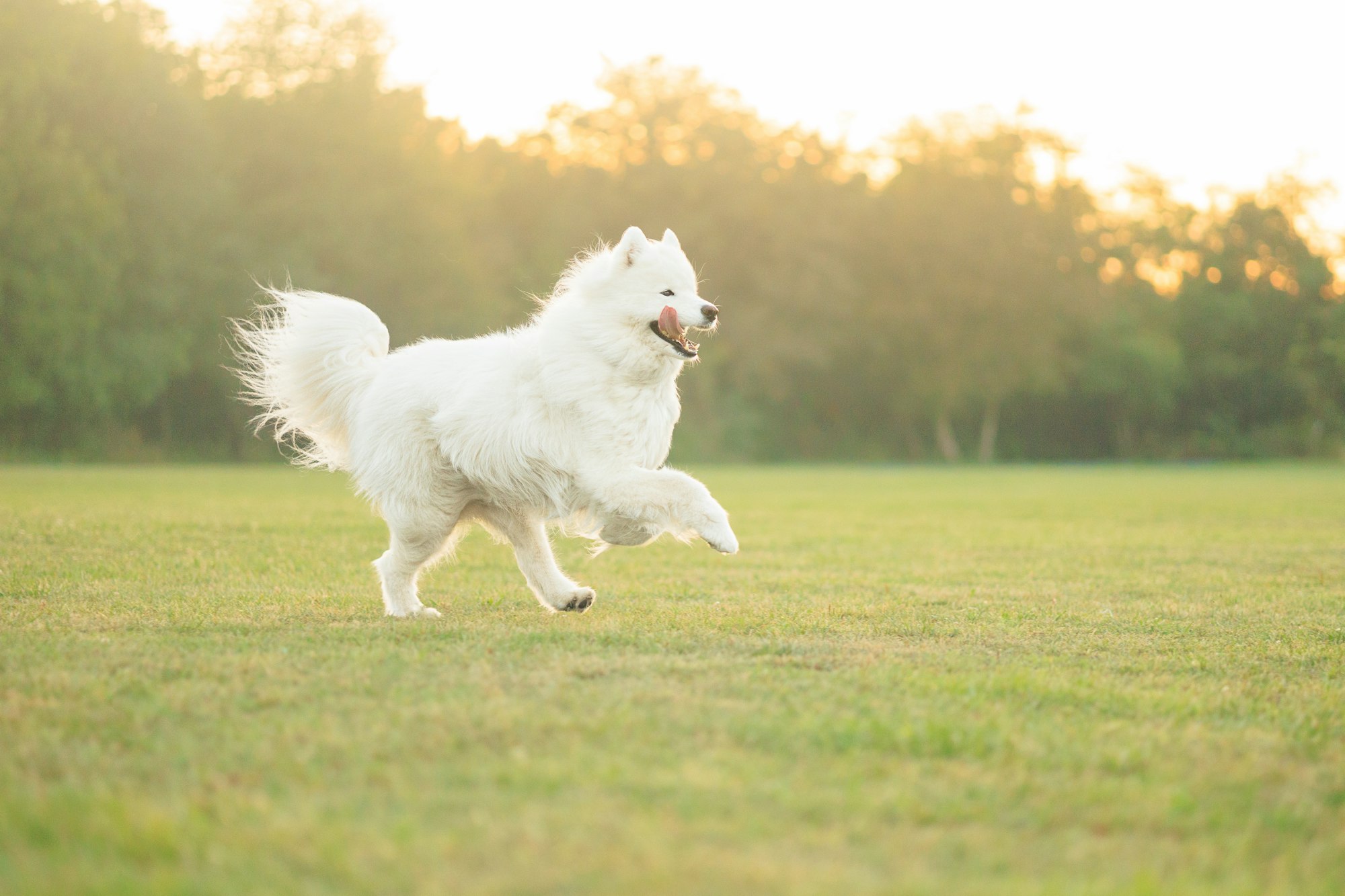In the world of dog breeds, the Samoyed, with its stunning white coat and friendly demeanor, has long captured the hearts of dog lovers. However, a prevalent question among potential dog owners and allergy sufferers is: Are Samoyeds hypoallergenic? This article aims to provide a comprehensive insight into this topic, debunking common myths and offering valuable information for those considering this breed.

Understanding Hypoallergenic Dogs
To delve into whether Samoyeds are hypoallergenic, it's essential first to understand what "hypoallergenic" means in the context of dogs. The term hypoallergenic is often used to describe breeds that are less likely to cause allergic reactions. However, it's crucial to note that no dog breed is completely hypoallergenic. All dogs produce dander, saliva, and urine, which can trigger allergies in sensitive individuals.
The Samoyed's Coat and Allergen Production
Samoyeds are known for their dense, fluffy coats. This double-layered coat consists of a soft, insulating undercoat and a longer, coarser outer coat. While the thick coat might seem like a magnet for allergens, it's not just the fur that causes allergies, but the proteins in a dog's dander, saliva, and urine.
Shedding and Allergy Considerations
One of the myths about Samoyeds is that they don't shed much. In reality, Samoyeds are heavy shedders, especially during seasonal changes. Regular grooming is vital to manage shedding and reduce the amount of hair and dander in the environment, which can be beneficial for allergy sufferers.
Grooming and Maintenance
Effective grooming is crucial in managing allergens. Regular brushing helps remove loose hair and dander and distributes natural oils throughout the coat. Bathing your Samoyed every six to eight weeks with a gentle, hypoallergenic shampoo can also reduce allergen levels. However, it's important not to over-bathe, as this can dry out their skin and increase dander production.
Allergy Management in the Home
For those with allergies, there are ways to reduce exposure to allergens at home:
- Regular Cleaning: Vacuuming and dusting regularly can significantly reduce allergens.
- Air Purifiers: Using air purifiers with HEPA filters can help trap dander and other airborne allergens.
- Limiting Access: Keeping your Samoyed out of certain areas, such as bedrooms, can create allergen-free zones.
Health Benefits of Samoyeds
Apart from the hypoallergenic aspect, Samoyeds offer numerous health benefits. Their friendly and sociable nature makes them great companions, potentially reducing stress and improving mental health. Their need for regular exercise can also encourage a more active lifestyle for their owners.
Choosing a Samoyed: Things to Consider
Before bringing a Samoyed into your home, consider the following:
- Allergy Test: If you have allergies, spend time with a Samoyed to see how you react.
- Time for Grooming: Ensure you have the time and resources for regular grooming.
- Space and Exercise: Samoyeds are active dogs that require space and regular exercise.

Living with a Samoyed: Lifestyle Adaptation
Adapting your lifestyle to accommodate a Samoyed is crucial for a harmonious coexistence, especially if allergies are a concern. Creating a routine that includes regular grooming, exercise, and clean living spaces can make a significant difference in managing allergen levels.
Exercise and Activity Needs
Samoyeds are a high-energy breed that thrives on physical activity. They require regular exercise to maintain their physical and mental health. Activities like walking, running, and playing fetch are excellent ways to keep them active. Their playful nature also makes them great companions for outdoor adventures.
Training and Socialization
Samoyeds are intelligent and often eager to please, making them relatively easy to train. Early socialization and consistent training are vital for developing well-behaved and sociable pets. Positive reinforcement techniques work best for this breed.
Diet and Nutrition
A well-balanced diet is essential for a Samoyed's health. High-quality dog food that meets their nutritional requirements is crucial. Given their thick coats and active nature, they may require diets rich in proteins and fats. Always consult a veterinarian for personalized dietary advice.
Health Considerations and Veterinary Care
Regular veterinary check-ups are vital to ensure your Samoyed's health. They are generally healthy, but like all breeds, they can be prone to certain health issues, such as hip dysplasia and eye problems. Early detection and treatment of any health concerns are crucial.
Emotional and Mental Well-being
Samoyeds are known for their affectionate and friendly nature. They thrive on companionship and do not do well when left alone for extended periods. Ensuring they are part of family activities and providing them with attention and love is crucial for their emotional well-being.
The Benefits of Owning a Samoyed
Owning a Samoyed comes with numerous benefits:
- Companionship: Their friendly and affectionate nature makes them excellent companions.
- Active Lifestyle: They encourage an active lifestyle, which is beneficial for physical health.
- Stress Relief: The bond between a Samoyed and its owner can offer significant stress relief and emotional support.
Creating an Allergen-Friendly Environment for Your Samoyed
For those with allergies, creating an environment that minimizes allergens is key to living comfortably with a Samoyed. Here are additional steps to consider:
Choosing the Right Furnishings
Opt for easy-to-clean surfaces and furnishings. Leather or faux leather furniture, hardwood floors, and washable curtains can significantly reduce the accumulation of dander and hair. Avoiding heavy carpets and rugs, or choosing low-pile options that are easier to clean, can also help.
Allergen-Reducing Bedding
If your Samoyed sleeps indoors, consider allergen-proof bedding for both you and your pet. Washable dog beds and hypoallergenic bedding for humans can reduce the presence of allergens in sleeping areas.
Regular Laundry Practices
Washing your clothes and your dog's bedding regularly can significantly reduce allergen accumulation. Use hot water and hypoallergenic laundry detergents for the best results.
Samoyed-Specific Allergy Medications
Some allergy sufferers find relief through over-the-counter or prescription allergy medications. Consult with a healthcare provider to explore options that might help reduce your symptoms when around your Samoyed.
Building a Stronger Immune Response
Exposure to allergens can, over time, help some individuals build a tolerance. However, this varies greatly and should not be relied upon without medical advice.
The Emotional Bond with Samoyeds
Despite the challenges that allergies might present, many find that the emotional bond with their Samoyed outweighs these issues. The joy and companionship they offer can be a powerful motivator in managing allergies effectively.

Community and Support
Joining a community of Samoyed owners can provide valuable support and advice. Online forums, local clubs, and dog shows are great ways to connect with others who share your love for the breed and may have insights into living with allergies.
The Unique Personality of Samoyeds
Samoyeds are not just beautiful; they have a unique and engaging personality. They are known for their "Sammy smile," a gentle and friendly expression that reflects their amiable nature. They are often good with children and other pets, making them excellent family dogs.
Environmental Enrichment for Your Samoyed
Ensuring your Samoyed has a stimulating environment is crucial for their well-being. Toys, puzzles, and regular playtime can keep them mentally stimulated and happy.
Commitment to Your Samoyed
Owning a Samoyed is a long-term commitment. They can live for 12-14 years, and ensuring you're prepared for this journey is essential. They're not just pets; they're family members who will share many years of joy and companionship with you.
The Samoyed's Role in History and Culture
Understanding the historical and cultural significance of the Samoyed breed adds another layer of appreciation for these magnificent dogs. Originating from Siberia, Samoyeds were bred by the Samoyedic peoples for herding reindeer, hunting, and pulling sleds. This rich heritage highlights their versatility, strength, and endurance.
The Significance of Their Heritage
The Samoyed's ability to survive in harsh, cold environments is a testament to their resilience. This history explains their thick coats, high energy levels, and strong working instincts. Recognizing this heritage can help owners provide a lifestyle that suits their natural tendencies.
Samoyeds in Modern Roles
Today, Samoyeds have adapted to various roles, from family companions to show dogs. They also excel in dog sports like agility, obedience, and herding trials. Understanding their working background can help in providing activities that fulfill their innate needs.
The Importance of Responsible Breeding
If considering a Samoyed puppy, choosing a responsible breeder is crucial. Ethical breeders prioritize health, temperament, and adherence to breed standards. They also provide valuable support and guidance to new owners.
Samoyeds and Children
Samoyeds are generally known for being good with children. Their gentle and playful nature makes them suitable companions for families. However, as with any breed, supervision and teaching children how to interact with dogs respectfully is essential.
Socializing Your Samoyed
Proper socialization from a young age is vital for Samoyeds. Exposure to various people, animals, and environments helps them become well-adjusted adults. Socialization classes and regular outings can be beneficial for this.
The Aesthetic Appeal of Samoyeds
The beauty of the Samoyed breed is undeniable. Their striking white coats, dark eyes, and smiling faces make them visually appealing. This aesthetic charm is one reason for their popularity, both in homes and in the show ring.
Coping with Common Samoyed Behaviors
Understanding common behaviors in Samoyeds, like digging and vocalizing, can help in managing them effectively. Providing adequate exercise and mental stimulation can mitigate these behaviors.
The Samoyed's Lifespan and Aging
As Samoyeds age, their needs change. Being prepared for the care of a senior dog is important. Regular veterinary check-ups, age-appropriate diets, and adjustments in exercise can ensure they remain healthy and comfortable in their senior years.
The Global Samoyed Community
There is a vibrant global community of Samoyed lovers. Engaging with this community can provide a wealth of knowledge and support. Breed clubs, dog shows, and online platforms offer opportunities to connect and share experiences.
The Samoyed's Impact on Mental and Emotional Health
The positive impact of Samoyeds on mental and emotional health cannot be overstated. Their presence can significantly reduce stress, anxiety, and loneliness. The bond shared with a Samoyed is often a source of comfort and joy for many owners.

Therapeutic Qualities of Samoyeds
Samoyeds have a naturally soothing presence, often used in therapeutic settings like nursing homes or hospitals. Their gentle and empathetic nature makes them excellent therapy dogs, providing comfort and support to those in need.
Adaptability of Samoyeds
One of the remarkable traits of the Samoyed is its adaptability. They can thrive in various environments, from apartments to large homes with yards, as long as their exercise and companionship needs are met. This adaptability makes them suitable for diverse lifestyles.
The Samoyed's Social Nature
Samoyeds are inherently social creatures. They enjoy being part of family activities and are often friendly towards strangers. This social nature makes them great pets for those who enjoy an active social life.
Samoyeds in Competitive Dog Sports
Beyond being family pets, Samoyeds have a knack for competitive dog sports. Their intelligence and agility make them strong competitors in events like obedience trials, agility courses, and sled dog racing.
The Importance of Positive Training Methods
Positive reinforcement training methods are particularly effective with Samoyeds. They respond well to rewards-based training, which strengthens the bond between the dog and its owner. Harsh training methods are discouraged, as they can damage the trust and relationship.
Understanding the Samoyed's Vocalizations
Samoyeds are known for their vocal nature. They may bark or howl to communicate. Understanding and managing this behavior through training and environmental enrichment can prevent excessive vocalization.
Samoyeds and Multi-Pet Households
Generally, Samoyeds get along well with other pets. However, proper introductions and socialization are key to ensuring harmonious relationships, especially in households with multiple pets.
Cost of Owning a Samoyed
Owning a Samoyed involves various costs, including food, grooming supplies, veterinary care, and training. Prospective owners should be prepared for these financial responsibilities to ensure the well-being of their Samoyed.

The Unconditional Love of a Samoyed
Perhaps the most compelling aspect of owning a Samoyed is the unconditional love they offer. They provide constant companionship, loyalty, and affection, enriching the lives of those they live with.
Conclusion
In conclusion, while the hypoallergenic status of Samoyeds is a complex issue, their value as companions is clear and profound. From their historical background to their therapeutic qualities, Samoyeds bring a unique and joyful presence to any home. They require commitment, but the rewards of their companionship, loyalty, and love are immeasurable. For those considering a Samoyed, it's a journey of mutual respect, love, and countless happy moments.
FAQs About Samoyeds and Allergies
1. Are Samoyeds truly hypoallergenic?
No, Samoyeds are not completely hypoallergenic. While they are less likely than some breeds to trigger allergies, they do produce dander, saliva, and urine, which can cause allergic reactions in sensitive individuals.
2. Can people with allergies live comfortably with a Samoyed?
Yes, many people with mild to moderate allergies live comfortably with Samoyeds. Managing allergies involves regular grooming of the dog, cleaning the home, using air purifiers, and in some cases, taking allergy medications.
3. How often should a Samoyed be groomed to reduce allergens?
Samoyeds should be brushed several times a week, and more often during their shedding seasons. Bathing should be done every six to eight weeks, using a gentle, hypoallergenic shampoo.
4. What are the best ways to reduce dog allergens in the home?
Regular vacuuming, using HEPA air filters, keeping the dog off furniture and out of bedrooms, and washing bedding frequently are effective ways to reduce allergens in the home.
5. Are Samoyeds suitable for families with children?
Yes, Samoyeds are generally known for being good with children. Their friendly and playful nature makes them suitable family pets. However, interactions should always be supervised, especially with younger children.
6. Do Samoyeds require a lot of exercise?
Yes, Samoyeds are active dogs that require regular exercise to maintain their health and happiness. Daily walks, play sessions, and other physical activities are recommended.
7. Can Samoyeds adapt to living in apartments?
Samoyeds can adapt to apartment living if their exercise and mental stimulation needs are met. However, they do best in environments where they have more space to move around.
8. How long do Samoyeds typically live?
Samoyeds typically have a lifespan of 12-14 years. With proper care, nutrition, and regular veterinary check-ups, they can enjoy a full and healthy life.
9. What health issues are Samoyeds prone to?
Samoyeds can be prone to certain health issues like hip dysplasia, eye problems, and skin conditions. Regular veterinary care and health screenings are important for early detection and treatment.
10. Are Samoyeds good therapy dogs?
Yes, Samoyeds are often used as therapy dogs due to their gentle nature and ability to provide comfort and emotional support. Their friendly demeanor makes them ideal for therapeutic settings.